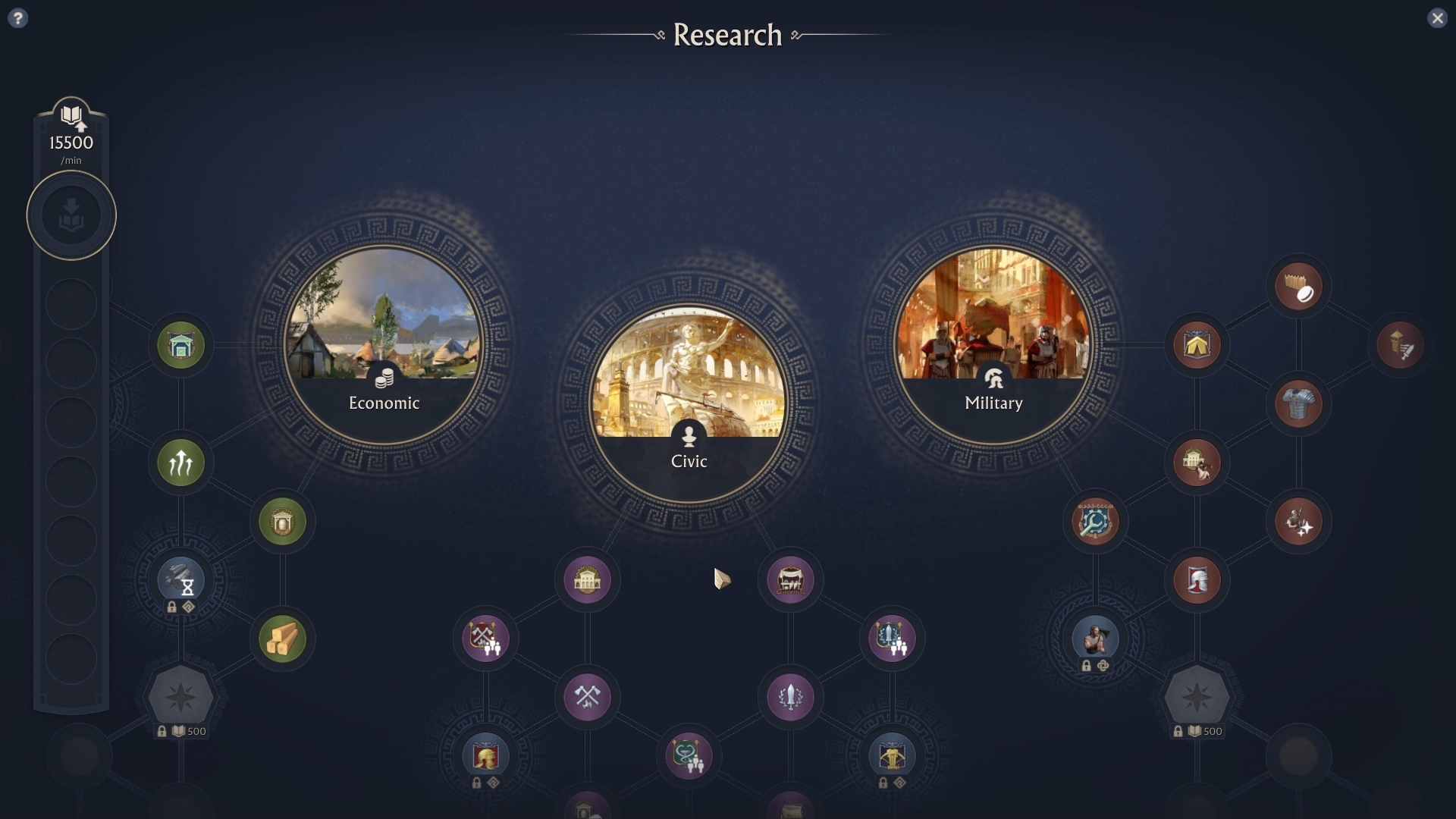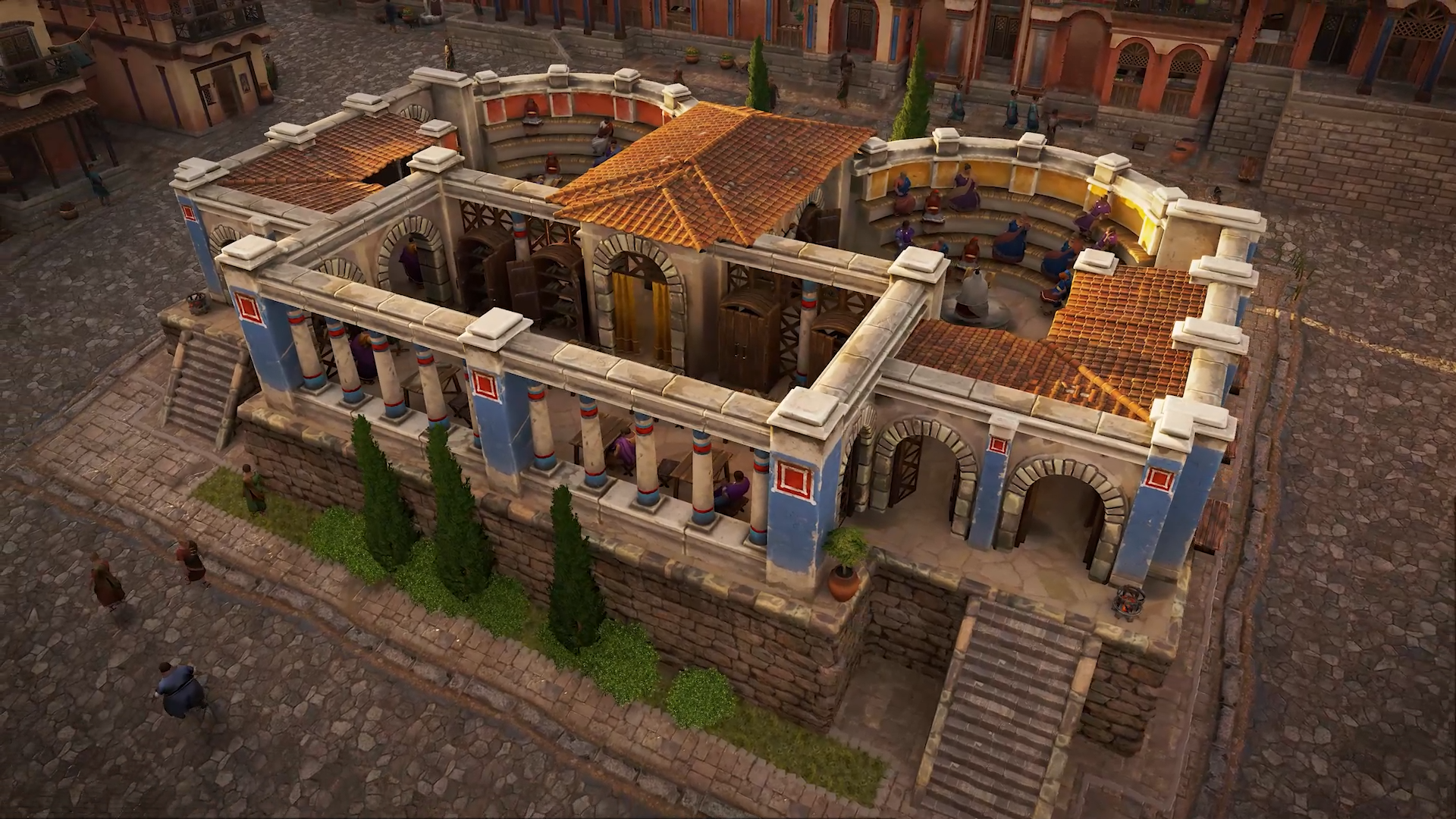The Discovery Tree is Anno 117: Pax Romana’s research system. It lets you unlock “discoveries” that expand your options and improve efficiency across your province. The tree is divided into three tracks—Economy, Civic, and Military—so you can emphasise trade and production, city services, or armed forces. You can queue multiple discoveries, and research speed scales with the Knowledge your cities produce.
Discovery Tree structure and focus areas
The tree’s three categories map cleanly to playstyle:
- Economy: logistics, production upgrades, resource access, road improvements.
- Civic: public services, city-range and utility tools, repair/maintenance options, quality-of-life upgrades.
- Military: unit performance, morale, toughness, and support for campaigns.
There are no mutually exclusive branches. With enough time, you can unlock everything. Progress still involves choices, because deeper nodes have higher costs and some sections are blocked by “Inspirations” (gates) that require you to meet specific conditions before you can pass.

Knowledge: the currency of research
Discoveries cost Knowledge. Knowledge is one of the game’s eight core attributes and is generated by buildings when their needs are fulfilled or when they receive relevant buffs. The more Knowledge you produce, the faster active research completes; the Discovery Tree shows the remaining time based on your current production.
Early, reliable sources of Knowledge include:
- Grammaticus: a public service for Plebeians that grants +3 Knowledge to all buildings in its area of effect. Dense placement around housing compounds Knowledge quickly.
- Writing Tablets for Eques (Tier 3): a household need that provides +3 Knowledge when supplied.
Attribute trade-offs matter. Wine, for example, bolsters Belief but partially counteracts education, so you may see a dip in Knowledge momentum if you lean on it early. Balance your city services and household needs to keep research flowing.

Inspirations: how gates shape progression
Inspirations are milestone gates embedded in the tree. To pass them, you must meet conditions such as:
- Establishing trade routes.
- Building a required number of aqueducts.
- Reaching a specified city status.
Some technologies and gates are province-specific. For instance, expansion from Latium to Albion opens a discovery that lets woodcutters plant trees in Albion’s meadows instead of relying solely on forests. These province nuances encourage varied development paths between maps.
Examples of impactful discoveries
| Category | Discovery | What it changes | Notes |
|---|---|---|---|
| Economy | Paved Roads | Transports move faster and the street range of buildings increases. | Requires manual road upgrades and additional resources. |
| Economy | Blood of Terra | Enables iron ore extraction on islands without deposits at a reduced rate. | Useful when your core province lacks iron nodes. |
| Military | Protective Entourage | Boosts Auxilia morale and toughness. | Improves staying power in land engagements. |
Beyond these, the tree surfaces utility unlocks that would otherwise be easy to miss. For example, repair capabilities for ships become an intentional research choice rather than a passive, easily overlooked progression step.
Research flow and timing
- Choose a discovery: each has a Knowledge cost and shows a dynamic completion time.
- Queue intelligently: line up multiple discoveries so progress continues while you build out Knowledge.
- Accelerate with city design: concentrate Grammaticus coverage near compact housing blocks and sustain Writing Tablets to push +Knowledge broadly.
- Watch gate requirements: if your next target sits behind an Inspiration, stage the needed trade route, infrastructure count, or city status first.
Tip: Paved Roads is a classic logistics pickup that produces immediate throughput gains, but budget the materials—it does not auto-upgrade existing roads.
Early-game blueprint for steady research
- Place a Grammaticus covering as many Plebeian residences as possible; expand housing within its radius before adding more services.
- Stabilise basic food and goods chains to keep residences upgraded and productive, then layer in Writing Tablets once you reach Eques.
- Select one branch to solve your current bottleneck: Economy for transport/resource constraints, Civic for service radius and utility, or Military if you anticipate conflict.
- Check the next Inspiration’s requirements and fold them into your building plan (e.g., queue aqueducts during a housing expansion).
Province-specific nuances
Some discoveries only appear—or only make sense—after you expand to a new province. A notable example is the Albion forestry improvement that allows woodcutters to plant trees in meadows. These unlocks can reshape island layouts and trade assumptions, so revisit the tree after major geographic milestones; new options often appear that reframe earlier limitations.
How the Discovery Tree scales over a long game
- Depth: there are 150+ discoveries across the three categories.
- No dead ends: there are no “either/or” locks that permanently exclude branches; you can reach everything over time.
- Ongoing value: the far end of the tree includes repeatable discoveries that grant recurring bonuses, ensuring excess Knowledge remains useful after you’ve cleared the main nodes.
While the system is optional, it consistently widens your production, logistics, and diplomacy toolset, making it easier to tailor provinces to your preferred strategy.
FAQ: common questions about the research tree
- Can I unlock everything? Yes. The tree is designed so that, given enough time and Knowledge, you can research all discoveries; there are no permanent either/or choices.
- Do paved roads upgrade automatically? No. The discovery unlocks the option, but you must upgrade roads manually and pay the resource costs.
- Is research per-province or global? Research is managed from the Discovery Tree, but some nodes and gates are province-specific and only become available—or apply—once you expand.
- What happens once I finish the tree? You can invest Knowledge into repeatable end-tree discoveries that provide ongoing bonuses.
- How do I speed up research? Increase your cities’ Knowledge production via Grammaticus coverage, Writing Tablets for Eques, and thoughtful neighborhood layouts that keep service and household needs fulfilled.
The Discovery Tree rewards deliberate city planning. Treat Knowledge like a production line of its own, align your queue with the next Inspiration gate, and pick unlocks that remove the bottleneck you’re facing now. Over time, the tree becomes a comprehensive toolbox you can draw from to reshape logistics, services, and military posture across your provinces.

